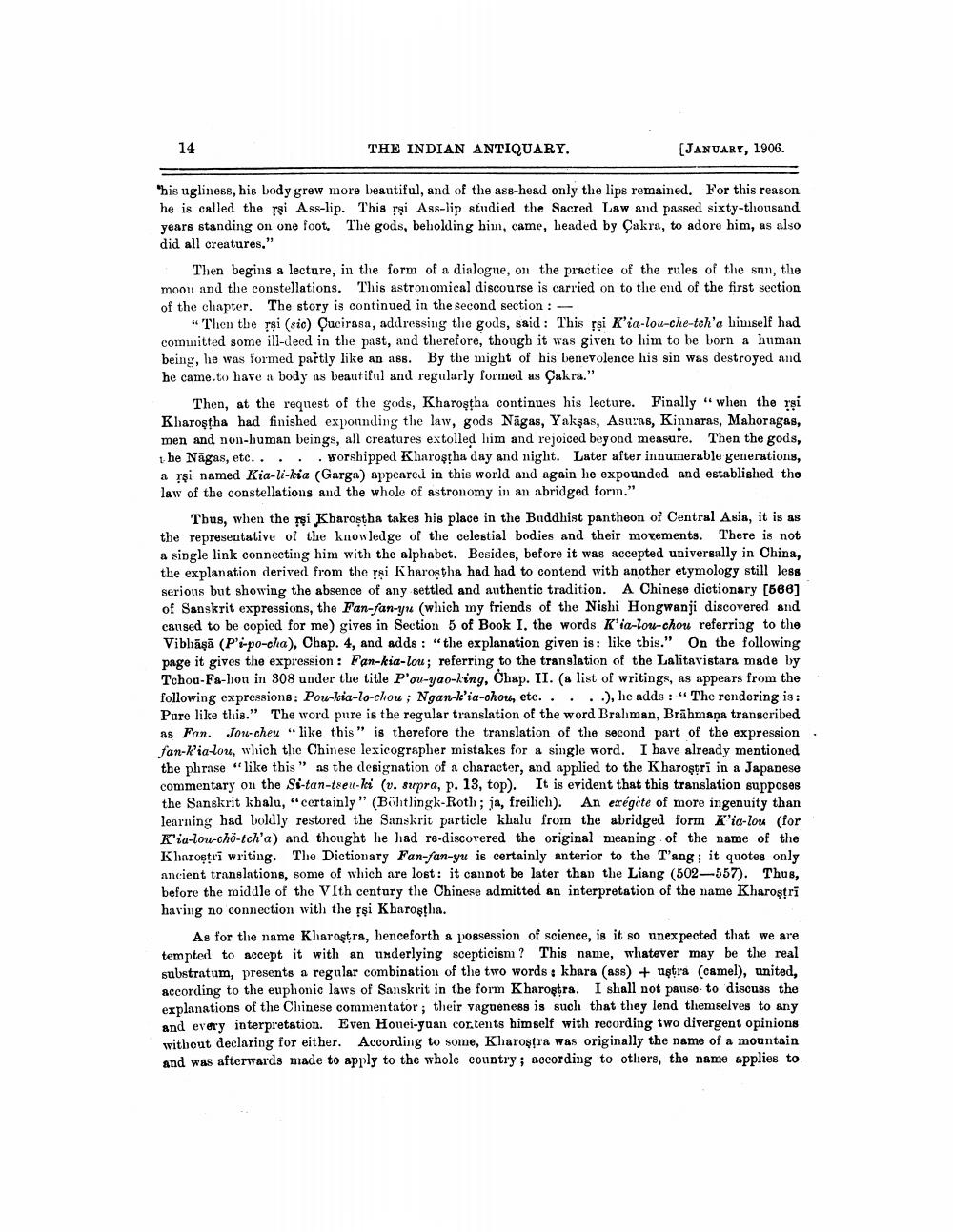________________
THE INDIAN ANTIQUARY.
"his ugliness, his body grew more beautiful, and of the ass-head only the lips remained. For this reason he is called the rşi Ass-lip. This rşi Ass-lip studied the Sacred Law and passed sixty-thousand years standing on one foot. The gods, beholding him, came, headed by Çakra, to adore him, as also did all creatures."
14
[JANUARY, 1906.
Then begins a lecture, in the form of a dialogue, on the practice of the rules of the sun, the moon and the constellations. This astronomical discourse is carried on to the end of the first section of the chapter. The story is continued in the second section:
"Then the rsi (sic) Cucirasa, addressing the gods, said: This rsi K'ia-lou-che-teh'a himself had committed some ill-deed in the past, and therefore, though it was given to him to be born a human being, he was formed partly like an ass. By the might of his benevolence his sin was destroyed and he came.to have a body as beautiful and regularly formed as Çakra."
Then, at the request of the gods, Kharostha continues his lecture. Finally "when the ri Kharostha had finished expounding the law, gods Nagas, Yaksas, Asuras, Kinnaras, Mahoragas, men and non-human beings, all creatures extolled him and rejoiced beyond measure. Then the gods, 1.he Nāgas, etc... . . worshipped Kharoştha day and night. Later after innumerable generations, a rşi named Kia-li-kia (Garga) appeared in this world and again he expounded and established the law of the constellations and the whole of astronomy in an abridged form."
Thus, when the rsi Kharostha takes his place in the Buddhist pantheon of Central Asia, it is as the representative of the knowledge of the celestial bodies and their movements. There is not a single link connecting him with the alphabet. Besides, before it was accepted universally in China, the explanation derived from the rsi Kharostha had had to contend with another etymology still less serious but showing the absence of any settled and authentic tradition. A Chinese dictionary [568] of Sanskrit expressions, the Fan-fan-yu (which my friends of the Nishi Hongwanji discovered and caused to be copied for me) gives in Section 5 of Book I. the words K'ia-lou-chou referring to the Vibhāṣā (P'i-po-cha), Chap. 4, and adds: "the explanation given is: like this." On the following page it gives the expression: Fan-kia-lou; referring to the translation of the Lalitavistara made by Tchou-Fa-hon in 308 under the title P'ou-yao-king, Chap. II. (a list of writings, as appears from the following expressions: Pou-kia-lo-chou; Ngan-k'ia-chou, etc... .), he adds: "The rendering is: Pure like this." The word pure is the regular translation of the word Braliman, Brāhmaṇa transcribed as Fan. Jou-cheu "like this" is therefore the translation of the second part of the expression fan-k'ia-lou, which the Chinese lexicographer mistakes for a single word. I have already mentioned the phrase "like this" as the designation of a character, and applied to the Kharoştri in a Japanese commentary on the Si-tan-tseu-ki (v. supra, p. 13, top). It is evident that this translation supposes the Sanskrit khalu, "certainly" (Böhtlingk-Roth; ja, freilich). An exégète of more ingenuity than learning had boldly restored the Sanskrit particle khalu from the abridged form K'ia-lou (for Kia-lou-cho-tch'a) and thought he had re-discovered the original meaning of the name of the Kharoştri writing. The Dictionary Fan-fan-yu is certainly anterior to the T'ang; it quotes only ancient translations, some of which are lost: it cannot be later than the Liang (502-557). Thus, before the middle of the VIth century the Chinese admitted an interpretation of the name Kharoştri having no connection with the rşi Kharostla.
As for the name Kharoştra, henceforth a possession of science, is it so unexpected that we are tempted to accept it with an underlying scepticism? This name, whatever may be the real substratum, presents a regular combination of the two words: khara (ass) +ustra (camel), united, according to the euphonic laws of Sanskrit in the form Kharoştra. I shall not pause to discuss the explanations of the Chinese commentator; their vagueness is such that they lend themselves to any and every interpretation. Even Houei-yuan cor.tents himself with recording two divergent opinions without declaring for either. According to some, Kharoştra was originally the name of a mountain and was afterwards made to apply to the whole country; according to others, the name applies to




